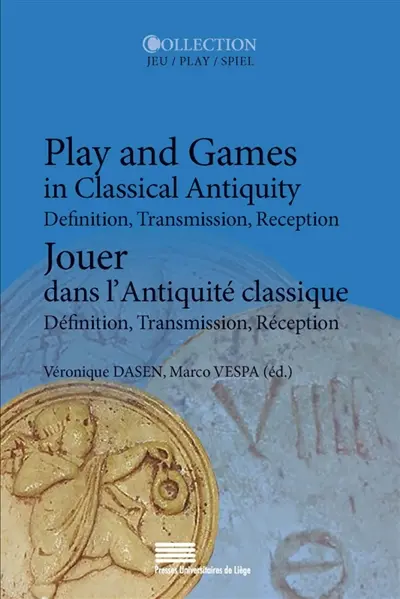en savoir plus

Permet à tous ses détenteurs d'obtenir 5% de réduction sur tous les livres lors du retrait en magasin (réduction non cumulable avec les réductions de type étudiant).
Offre également un certain nombre d'avantages auprès de nos partenaires.
Avec les favoris, retrouvez dans un espace les sélections effectuées au fur et à mesure de vos navigations dans le site.
Constituez pour votre usage personnel vos listes de livres en prévisions d'achats futurs et votre sélection d'articles, dossiers, événements, vidéos ou podcasts préférés ou à découvrir plus tard...
Il suffit simplement de cliquer sur "Ajout Favori" sur chaque page qui vous intéresse pour les retrouver ensuite dans votre espace personnel.
Requiert un compte Mollat
Requiert un compte Mollat
Play and games in classical Antiquity : definition, transmission, reception. Jouer dans l'Antiquité classique : définition, transmission, réception
en savoir plus
Résumé
Des contributions sur la place du jeu dans l'Antiquité, son rôle dans la vie privée et publique ainsi que les fonctions profanes ou sacrées des jouets. ©Electre 2026
Quatrième de couverture
The European Research Council project (Locus Ludi. The Cultural Fabric of Play and Games in Classical Antiquity [ERC AdG #741520]) investigates how play and games provide a privileged access to past societal norms, values, identities, and collective imaginary. People play all over the world and throughout history, but they do not play the same games, nor do they attribute the same meaning and function to play. This pluridisciplinary volume investigates how such an important part of ancient cultures can be methodologically reconstructed. A first series of chapters based on Greek and Roman texts and vocabulary propose an emic definition of play and games. Beyond the common association of child and play (in Greek, paidia, « play », pais, « child », and paideia, « education », share the same root, in Latin ludus means « play », « school », and « rethorical games »), ancient views are more complex and nuanced. The boundaries between sport, dance, rites and play are fluid and differ from our modern view. Case studies show how playful practices can be defined in material culture and iconographic representations. The second part of the volume focuses on Greek and Roman ludic heritage in ancient literature with particular attention to the cultural and discursive codes according to literary genre (oniromancy, proverbs, children's rhymes, lexicography...). Close studies assess the transmission of a predominantly oral heritage in collections, lexicons and commentaries ranging from the Roman imperial period to Byzantine times (proverbs, riddles, and children's lore). New insights are provided on crucial issues about cultural continuities and discontinuities, as well as the definition of so-called « traditional » games.
Fiche Technique
Paru le : 18/11/2021
Thématique : Autres périodes antiquité
Auteur(s) : Non précisé.
Éditeur(s) :
Presses universitaires de Liège
Collection(s) : Jeu = Play = Spiel
Contributeur(s) : Editeur scientifique (ou intellectuel) : Véronique Dasen - Editeur scientifique (ou intellectuel) : Marco Vespa
Série(s) : Non précisé.
ISBN : 978-2-87562-288-4
EAN13 : 9782875622884
Reliure : Broché
Pages : 517
Hauteur: 24.0 cm / Largeur 16.0 cm
Épaisseur: 3.3 cm
Poids: 1040 g

